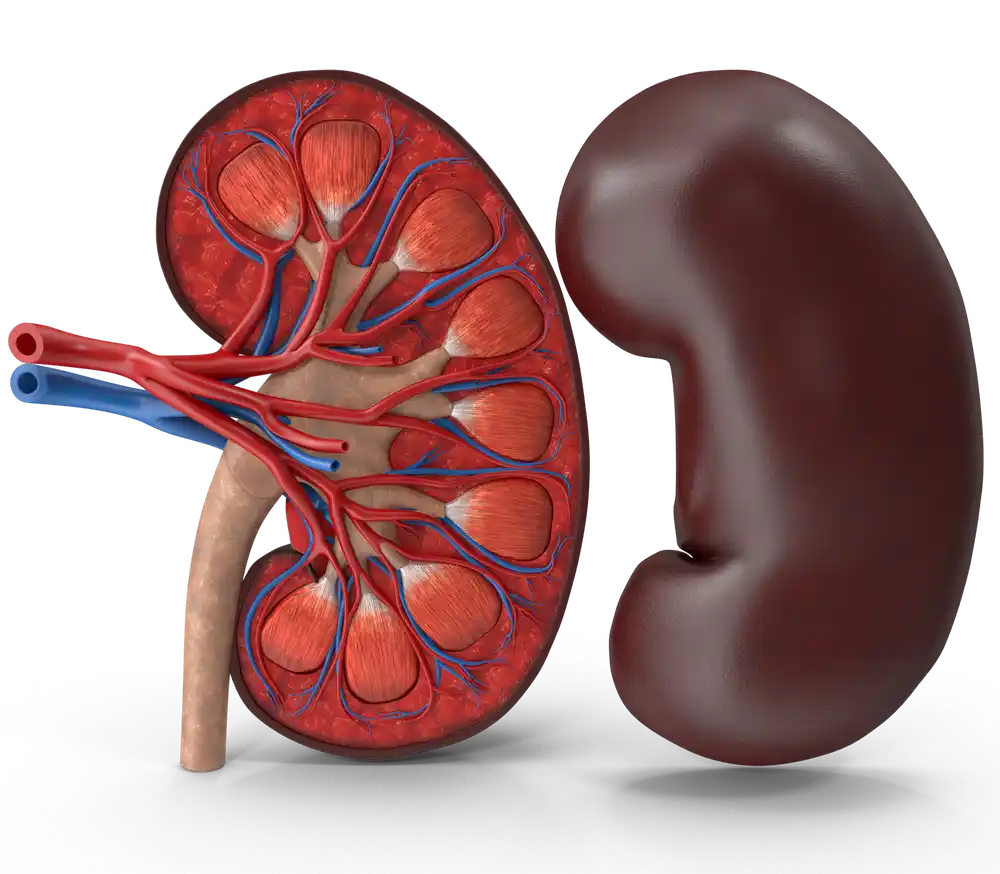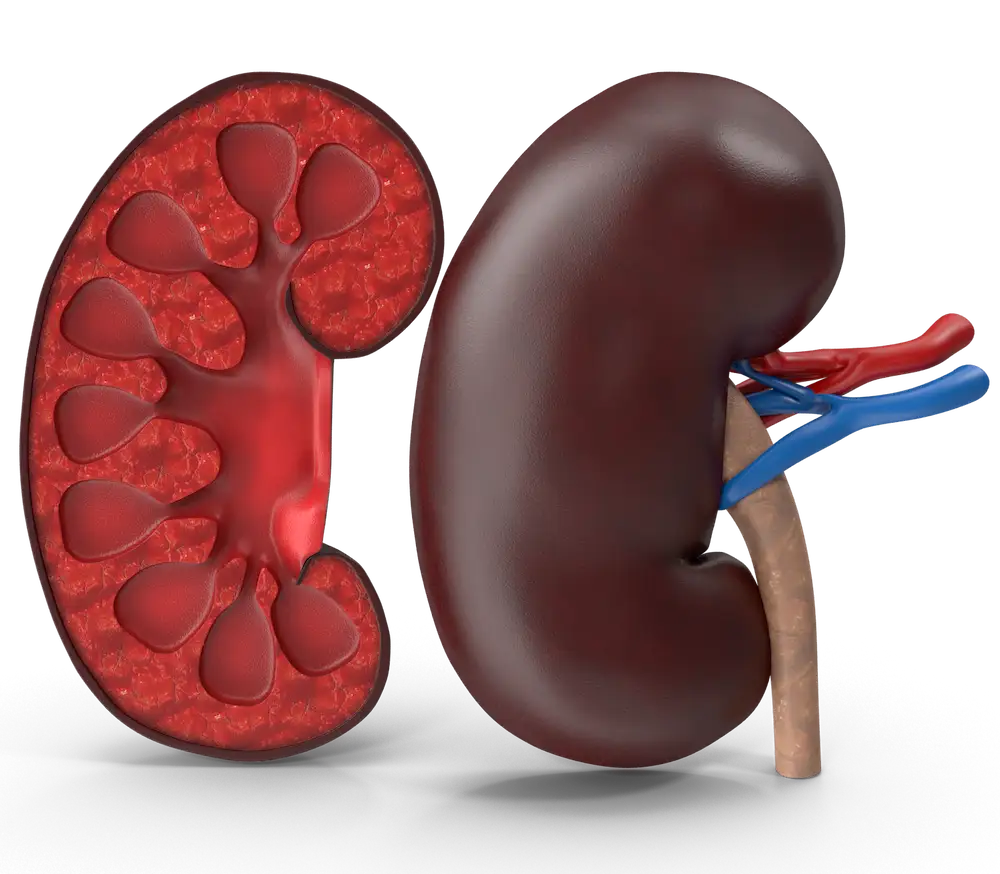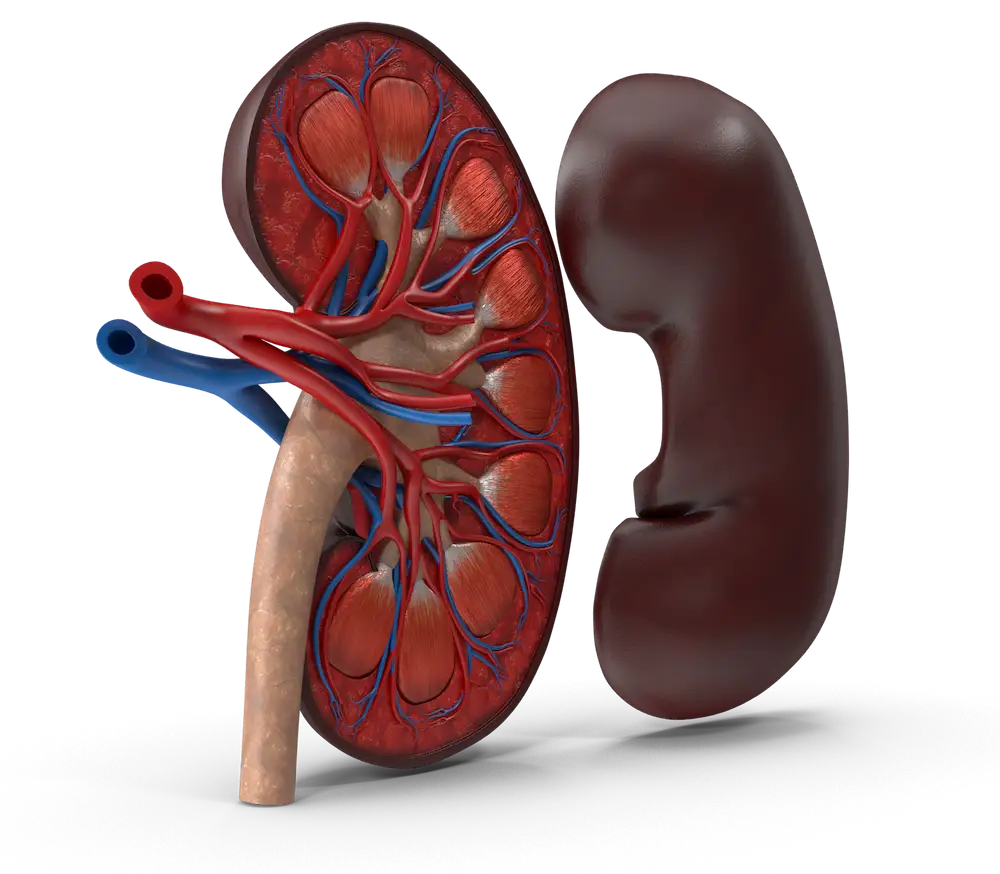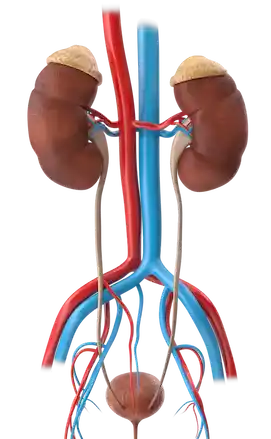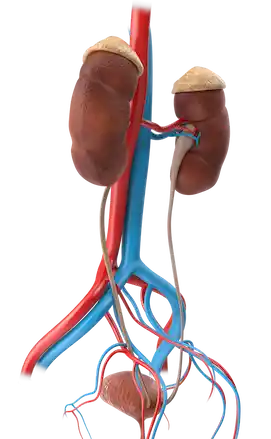Kidney Transplant
What is Kidney Transplant?
A kidney transplant is a surgical procedure to place a healthy kidney from a living or deceased donor into a person whose kidneys are no longer functioning properly. This results in renal failure and may require a patient to approach the best kidney transplant hospital in Chennai for getting a sophisticated treatment.
The main reason for opting the best kidney transplant hospital in Chennai is mostly because of the end-stage kidney disease which is a severe deterioration of kidney function. This can further lead to life-threatening complications such as fluid build-up, electrolyte imbalances, and high levels of waste products in the blood.
In a kidney transplant, the recipient’s own damaged or non-functioning kidneys are left in place, and the new kidney is connected to the recipient’s blood vessels and bladder to start filtering waste from the blood.
Most people who receive a kidney transplant experience an improvement in their quality of life and a reduction in symptoms related to kidney failure, and are even able to stop dialysis treatments.
However, it’s important to note that the best kidney transplant in Chennai is a major surgical procedure, and there is a risk of complications such as rejection of the transplant, infection, and bleeding. Additionally, recipients must take immunosuppressive medications for the rest of their lives to prevent rejection of the transplanted kidney.
When is Kidney Transplantation Required?
A kidney transplant may be recommended when a person has end-stage kidney disease, which is a severe deterioration of kidney function that can lead to life-threatening complications. Some of the common causes of end-stage kidney disease include:
- Diabetes: High blood sugar levels over time can damage the kidneys.
- Hypertension: High blood pressure can cause damage to the blood vessels in the kidneys.
- Glomerulonephritis: This is a group of diseases that affect the small blood vessels in the kidneys.
- Polycystic Kidney Disease: This is a genetic condition in which fluid-filled cysts develop in the kidneys and enlarged over time.
When end-stage kidney disease occurs, a person may need to undergo dialysis which is a procedure that filters waste and excess fluid from the blood, or receive a kidney transplant to replace the damaged kidneys.
The decision to undergo the best kidney transplant hospital in Chennai depends on several factors including the person’s overall health, the availability of suitable donors, and the patient’s personal preferences.
A kidney transplant is the best form of kidney replacement therapy as it offers several benefits over dialysis, including:
- Improved Quality of Life: A successful kidney transplant at the kidney transplant hospital in Chennai can allow a person to return to a more normal lifestyle and activities including work and exercise.
- Increased Lifespan: A transplanted kidney can last for many years and significantly improve a person’s life expectancy.
- Better Treatment of Other Medical Conditions: A functioning kidney can help improve overall health and well-being, and may allow a person to better manage other medical conditions.
- Cost Savings: A transplant can be less expensive in the long term compared to ongoing dialysis treatment.
Overall, a kidney transplant is the treatment of choice for people with end-stage kidney disease.
Types of Kidney Transplant
There are two main types of kidney transplants: living donor transplants and deceased donor transplants, each with its unique procedures and benefits.
Living Donor Transplant
A living donor transplant involves taking a healthy kidney from a living person, such as a family member, friend, or a willing donor, and transplanting it into the recipient. The Kidney Transplant Hospital in Chennai offers several advantages for this type of transplant, including a reduced wait time and a higher success rate due to the excellent condition of the donor kidney.
Deceased Donor Transplant
A deceased donor transplant involves transplanting a kidney from a recently deceased person who had designated their organs for donation. This type of transplant provides opportunities for patients without a suitable living donor. Kidney Transplant Hospital in Chennai has state-of-the-art facilities and expert teams to handle such complex procedures.
Other Variations of Kidney Transplantation
In addition to the two main types, there are other variations, such as:
- Directed Donation: A living donor, who may not be biologically related, donates a kidney to a specific recipient.
- Paired Exchange Transplant: Two pairs of incompatible donors and recipients exchange kidneys.
- Altruistic Donation: A person donates a kidney to a stranger without expecting anything in return.
At the Kidney Transplant Hospital in Chennai, all these variations are expertly managed, ensuring optimal outcomes for patients.
Common Symptoms of Kidney Diseases
Early detection of kidney disease can make a significant difference in treatment outcomes. Watch out for these common symptoms:
- Persistent fatigue and weakness.
- Swollen feet, ankles, or hands due to fluid retention.
- High blood pressure that’s difficult to control.
- Changes in urination patterns, such as foamy urine or increased frequency.
- Nausea, vomiting, and loss of appetite.
- Muscle cramps and pain in the lower back or sides.
These symptoms may develop gradually and worsen over time. Seeking timely medical attention at the best kidney transplant in Chennai is crucial for preventing further complications.
Kidney Transplantation Procedure
The kidney transplantation procedure at a Kidney Transplant Hospital in Chennai involves several critical steps:
Evaluation
Before undergoing a kidney transplant, recipients are evaluated to determine if they are suitable candidates. This evaluation includes medical assessments, laboratory tests, and imaging studies.
Donor Matching
For living donor transplants, the donor and recipient undergo compatibility testing. In the case of deceased donor transplants, recipients are placed on a waiting list until a suitable kidney becomes available.
Surgery Preparation
Both the donor and recipient undergo preoperative testing, including laboratory tests and imaging. The recipient may receive medications to prepare their body for the transplant at the best hospital for kidney transplant in Chennai.
Surgery
The kidney transplant surgery is performed under general anesthesia and typically takes several hours. The new kidney is placed in the lower abdomen and connected to the recipient’s blood vessels and bladder.
Recovery
Post-surgery, recipients are closely monitored to ensure the transplanted kidney is functioning properly. They will need to stay in the Kidney Transplant Hospital in Chennai for several days and take immunosuppressive medications to prevent rejection.
Follow-Up Care
Regular follow-up appointments are crucial to monitor the kidney’s function and check for any signs of rejection. Recipients must adhere to their immunosuppressive medication regimen for the rest of their lives to maintain the health of the transplanted kidney.
The cost of kidney transplant in Chennai varies based on the hospital and the specifics of the patient’s care, but investing in a successful transplant can significantly improve the recipient’s quality of life.
Causes of Kidney Failure
- Chronic Kidney Disease (CKD): CKD involves a gradual loss of kidney function over months or years, often due to conditions like diabetes or hypertension.
- Diabetes: High blood sugar levels can damage kidney tissues, leading to diabetic nephropathy, a major cause of kidney failure.
- Hypertension: Uncontrolled high blood pressure can damage kidney vessels, impairing their ability to filter blood effectively.
Early intervention at a Kidney Transplant Hospital in Chennai can help manage these conditions and prevent the progression to kidney failure.
Functions of the Kidney
The kidneys are essential organs responsible for several critical functions, such as:
- Filtering waste and toxins from the blood.
- Regulating blood pressure by controlling the balance of salt and water.
- Producing essential hormones that aid in red blood cell production and maintaining bone health.
- Managing the balance of electrolytes like sodium, potassium, and calcium in the body.
Kidneys work quietly to maintain the body’s internal environment, but when they begin to fail, the consequences can be severe. This is where the best kidney transplant hospital in Chennai comes into play, offering comprehensive solutions for kidney issues.
Kidney Transplant Eligibility
Before considering a kidney transplant, patients must meet specific eligibility criteria:
End-Stage Kidney Disease
Patients diagnosed with end-stage kidney disease, which requires dialysis or a transplant to maintain life, are primary candidates for a kidney transplant.
Good General Health
Candidates must be in good overall health, free from other serious conditions that could complicate the transplant or reduce its success rate. The Kidney Transplant Hospital in Chennai provides thorough evaluations to determine eligibility.
Age Requirements
While there is no strict age limit, some hospitals may have age restrictions based on the patient’s overall health and life expectancy.
Willingness to Take Immunosuppressive Medications
Recipients must commit to taking immunosuppressive medications for life to prevent organ rejection. The Kidney Transplant Hospital in Chennai ensures that patients understand the importance of these medications.
Psychological Evaluation
A psychological evaluation ensures that the patient is emotionally and mentally prepared for the transplant and the associated lifestyle changes.
Absence of Harmful Substances
Patients must be free from harmful substances such as alcohol and illegal drugs, which could interfere with the success of the transplant.
Active Involvement in Care
Recipients must actively participate in their care, including adhering to their medication regimen and attending regular follow-up appointments.
Meeting these criteria at the best hospital for kidney transplant in Chennai increases the likelihood of a successful transplant and long-term health.
Common Treatments for Kidney Diseases
Depending on the severity and type of kidney disease, treatment options may vary. Some common treatments include:
- Medications: To control blood pressure, manage symptoms, and slow the progression of kidney disease.
- Dialysis: A treatment that performs the function of the kidneys by removing waste and excess fluid from the blood.
- Kidney Transplant: A long-term solution where a diseased kidney is replaced with a healthy donor kidney. The best kidney transplant hospital in Chennai provides state-of-the-art transplant facilities with a high success rate.
Other treatments may include lifestyle changes, such as a low-sodium diet and increased water intake, to support kidney health. However, when advanced kidney disease occurs, a transplant becomes the most viable solution for many patients.
Post-Surgery Care
The success of a kidney transplant depends not only on the surgery but also on post-surgery care. Here’s what to expect:
Medications
Taking the correct medications, particularly immunosuppressive drugs, is crucial to prevent rejection of the new kidney. These medications must be taken as prescribed and on time.
Follow-Up Appointments
Regular follow-up appointments at the Kidney Transplant Hospital in Chennai allow the healthcare team to monitor progress, check for signs of rejection, and adjust medications as needed.
Diet and Lifestyle Changes
A balanced diet, staying hydrated, avoiding harmful substances, and regular physical activity are essential for maintaining the health of the new kidney.
Managing Stress
Stress management is critical as stress can weaken the immune system, increasing the risk of rejection or complications. Patients should engage in activities like exercise, meditation, or counseling to manage stress effectively.
Support Network
A strong support network of friends, family, and support groups is crucial for emotional and practical support during recovery.
The Kidney Transplant Hospital in Chennai provides comprehensive support to ensure patients have the resources needed for a successful recovery.
Post-Surgery Diet & Nutrition
A healthy diet is essential for the success of a kidney transplant. The Kidney Transplant Hospital in Chennai offers the following dietary guidelines:
Adequate Fluid Intake
Drinking plenty of fluids helps to flush out waste products and prevent dehydration. Specific fluid guidelines are provided based on individual needs.
Sodium Restrictions
Limiting sodium intake is crucial as excessive salt can cause fluid retention and raise blood pressure, which can be harmful to the new kidney.
Protein Requirements
While protein is important for building and repairing tissue, too much can strain the new kidney. The best hospital for kidney transplant in Chennai tailors protein recommendations to each patient’s needs.
Vitamin and Mineral Supplements
Kidney transplantation can sometimes lead to nutrient deficiencies, so patients may need supplements, such as vitamin D or iron, to support their health.
Avoiding Harmful Foods
Patients should avoid alcohol, caffeine, and high-potassium foods, as these can be harmful to the new kidney. The Kidney Transplant Hospital in Chennai provides personalized dietary advice to support the success of the transplant.
Choosing the Right Kidney Transplant Hospital in Chennai
Selecting the right hospital for a kidney transplant is a critical decision. Here are some factors to consider:
Experience and Expertise
Choose a hospital with a proven track record of successful kidney transplants and a team of experienced professionals, including surgeons, transplant coordinators, and nephrologist specialists. The Kidney Transplant Hospital in Chennai is known for its expertise and high success rates.
Patient Outcomes
Research the hospital’s success rates, including patient survival and organ rejection rates. The Kidney Transplant Hospital in Chennai provides transparent data on outcomes, ensuring you can make an informed decision.
Available Resources
Ensure the hospital has the latest technology and resources, such as advanced surgical equipment and immunosuppression protocols, to support your care.
Coordination with Insurance
Make sure the hospital is in-network with your insurance provider to receive the best possible coverage. Understanding the cost of kidney transplant in Chennai and what your insurance will cover is essential.
Patient Support Services
Consider the patient support services offered, such as pre- and post-transplant education, counseling, and support groups. The Kidney Transplant Hospital in Chennai provides comprehensive support services to help you navigate the transplant process.
By considering these factors, you can choose the best hospital for kidney transplant in Chennai that meets your needs and maximizes the chances of a successful transplant. The kidney transplant cost in Chennai can vary, but selecting a hospital with a strong reputation and support services can be a worthwhile investment in your long-term health.
Frequently Asked Question
Vinita Hospitals in Chennai is widely recognized as one of the best hospitals for kidney transplants. It boasts a highly experienced team of nephrologists and transplant surgeons, state-of-the-art facilities, and a comprehensive transplant program. The hospital’s track record in performing successful kidney transplants has earned it a reputation for excellence in renal care.
The success rate of kidney transplants in Chennai is generally high, with many leading hospitals reporting success rates of around 85-90% for one-year graft survival. Factors contributing to these outcomes include advanced medical technology, skilled surgeons, and comprehensive post-operative care. These success rates are comparable to global standards, reflecting the quality of healthcare in the city.
The minimum life expectancy after a kidney transplant can vary, but on average, the transplanted kidney functions well for about 10-15 years. Many patients enjoy a significantly improved quality of life compared to dialysis. With advancements in immunosuppressive medications and post-operative care, some recipients live 20 years or more post-transplant, highlighting the procedure’s potential for long-term success.
The best age for a kidney transplant varies, but it is often recommended for individuals between 18 and 65 years old. This age range typically ensures the patient can handle the surgery and the necessary post-operative care. At a top Kidney Transplant Hospital in Chennai, medical teams evaluate patients on a case-by-case basis.
Certain individuals cannot receive a kidney transplant due to health complications such as active infections, cancer, or severe cardiovascular disease. Additionally, those with uncontrolled mental health disorders or substance abuse issues may also be deemed ineligible. Kidney Transplant Hospitals in Chennai conduct thorough evaluations to ensure the safety and success of the procedure.
Individuals with chronic health conditions like diabetes, hypertension, cancer, or infectious diseases are typically not eligible to donate a kidney. Additionally, those with kidney disease or a history of kidney problems are also excluded. Kidney Transplant Hospitals in Chennai ensure potential donors undergo rigorous medical assessments to confirm their suitability for donation.
Many people live healthy, normal lives with one kidney. The remaining kidney typically adapts to perform the necessary functions. With proper medical care and a healthy lifestyle, individuals can live for several decades after donating a kidney or having one removed. Kidney Transplant Hospitals in Chennai provide extensive post-operative care and guidance for patients with a single kidney.

